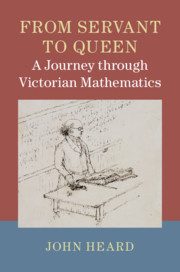Book contents
- From Servant to Queen
- Frontispiece
- From Servant to Queen
- Copyright page
- Dedication
- Contents
- Figures
- Acknowledgements
- Notes for the Reader
- 1 Setting the Scene
- 2 The Legacy of Newton
- 3 The London Mathematical Society
- 4 The Pure Mathematician as Hero
- 5 Mathematicians in an Aethereal World
- 6 Apologias for Pure Mathematicians
- 7 Embracing Beauty
- Epilogue
- Select Bibliography
- Index
- References
- From Servant to Queen
- Frontispiece
- From Servant to Queen
- Copyright page
- Dedication
- Contents
- Figures
- Acknowledgements
- Notes for the Reader
- 1 Setting the Scene
- 2 The Legacy of Newton
- 3 The London Mathematical Society
- 4 The Pure Mathematician as Hero
- 5 Mathematicians in an Aethereal World
- 6 Apologias for Pure Mathematicians
- 7 Embracing Beauty
- Epilogue
- Select Bibliography
- Index
- References
- Type
- Chapter
- Information
- From Servant to Queen: A Journey through Victorian Mathematics , pp. 247 - 256Publisher: Cambridge University PressPrint publication year: 2019

